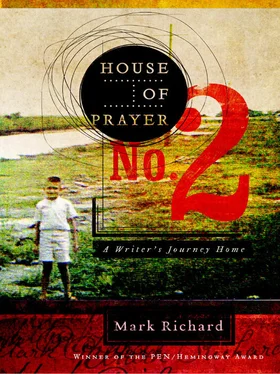The money they give the old black sharecropper for the secret shoreline is all the money they can scrape out of their savings and their banks. The old black sharecropper accepts the first offer the father and the German make on the land left to him by his daddy. Most of the shoreline property they buy from the timber company, but they need an access road through the old black sharecropper’s front yard, past his shack. Everyone knows the lake is coming, but the father and the German don’t tell the black sharecropper the size of their shoreline purchase, just as the sharecropper doesn’t tell them he has also eyeballed where the shoreline will appear and is going to use their money to build the state’s first black marina with jukeboxes and barbeque pits right next to their subdivision. He doesn’t tell them they just gave him the seed money to build H. W. Huff’s Marina and Playland.
Twenty acres of waterfront property, two points with a long, clay, slippery cove between them when the dam closes and the lake floods. The German gets his choice of which half of the property is his because he was somehow able to put up ten percent more money at the last minute. He chooses the largest point, the one with sandy beaches all around it. The father gets the wet, slippery clay bank and muddy point. The father tells the mother it is time to meet some new friends.
Meet the American Oil dealer, the one with the pretty wife from Coinjock, North Carolina, a wide grin, and a Big Daddy next door. Down in the basement of his brand-new brick home on a brick mantel the oil dealer has a little ship he put together in college. Most people, if they were even guessing, foot up near the fire, glass leaning with bourbon, take the little model to be a Viking ship. It is not a Viking ship even though little fur-tuniced men seated along both rails pull oars beneath a colorful sail. Who is that man tied to the mast? asks the special child. Upstairs the adults play Monopoly in the kitchen and drink beer until the father drinks a lot of beer and begins to complain about Sherman’s March, and Germans, and it is time to go home.
Later on, the special child is guarding his house with his Confederate hat and wooden musket while his mother and father are at the hospital having a baby. The oil dealer drives over in his big car and spends the afternoon with the special child. He has a paper sack full of Japanese soldiers you shoot into the air with a slingshot and they parachute into the shrubbery. He shows the special child how to make a throw-down bomb with matchheads and two bolts, but best of all, in a shoe box he has brought the special child the little ship off the brick mantel and tells him who Ulysses was. It is a good story. The only part of the story the child does not quite believe is that somehow Ulysses was older than Jesus. He doesn’t say anything to the oil dealer, because the oil dealer was being nice, but he will have to ask Miss Perk about that later.
Here’s some pieces that have come off the ship over the years, the oil dealer says. There are a couple of Ulysses’ men in his shirt pocket. Thank you, says the child. The child spends the weekend at the oil dealer’s house with his wife and children waiting for his mother and father to come home from the hospital empty-handed again.
MORE BAD LUCK. The people at the dam the father calls the idiots keep turning the knobs on the water back and forth. One day the father and the German take their families on a surprise picnic to look at their waterfront property, and way up from their land they can see the lake, way down there over miles of mud. Then one day they come back and find Mr. Huff sitting on the front porch of his sharecropper’s shack surrounded by water. All y’all’s land underwater , says Mr. Huff. Ain’t nothing you can do about it. Man came round and said so. Said it’s in your deed . The father and the German go to see a lawyer. Mr. Huff is right.
One night while his mother is fixing supper, bad luck starts for the special child. He is in the living room, where he had seen an angel pass through Easter morning, watching The Three Stooges with the sound turned down real low because The Three Stooges upsets his mother. It is a good Three Stooges . It was the one where Moe and them run back and forth up and down some train cars and stuff happens and there’s a lion loose out of the baggage car, but the best part is when Moe keeps stubbing his toe on somebody’s little suitcase every time he runs past it until finally Moe opens the train door and throws the little suitcase off the train into the night. And Moe doesn’t stop there; he keeps throwing suitcases off the train, all by himself, he just keeps throwing suitcases off the train in the middle of the night until he looks around and sees that he has thrown everything off the train he possibly could, and then he can relax and be himself again and not be angry anymore. The child has seen this Three Stooges before, but this is his favorite. The only problem, this night, watching it with the sound turned down real low while his mother cooks supper waiting for the father to come home, the only problem is that partway through the show, the child hears a truck just outside slam on its brakes and blow its horn, and he hears a dog yelp, and he hears cars slow down and people getting out and men talking and somebody going around the neighborhood knocking on doors and asking whose dog is that, and he hears the people downstairs answer the door, he hears Prince say, Yeah, he thinks he knows whose dog it is, and he hears Prince call up the staircase to the mother she might want to come down ’cause it looks like a dog looking like their dog got hit by a log truck, and the mother says, Oh no , and comes in where the child is watching Moe start to throw the suitcases from the train with the sound turned down real low, and she says, We’d better go see about Hamburger , but the child does not move from the TV he is kneeling so close in front of, and the mother has her coat on now and says, Did you hear me? Hamburger just got hit by a truck , and still the child does not move, does not make movements to get up, even though he loves his dog and if it were true that his dog were dead, then he would want to die as well, but the child kneels in front of the TV and concentrates on Moe throwing the suitcases off the train, because deep inside him he knows that he can concentrate really hard, like when he learned the Kennedy speech, like when he stepped on a copperhead and the snake would not bite him, even though it should have, the child knows that if he can only concentrate hard enough, Moe will keep throwing everything off the train forever and time will stand still and he will never have to die because he will not have to go downstairs and see his dog twisted and smeared across the street and hear somebody, maybe the nervous log-truck driver, maybe Prince himself, make a joke about what his dog’s name used to be and what the dog is now.
He never goes downstairs. He just concentrates in his mind to make the story go on forever, and the news comes on, and his mother comes up from the street, and she looks at him in a new way, like maybe what some people and some teachers say about him is true and maybe they ought to have the special child tested.
The father comes home late that evening after hand-digging a firebreak by almost himself down in some cornpone county where the rednecks came out to watch the fire burn a stand of company pine. For about eighteen hours the father and a pulpwood contractor and his pimply son worked to turn a fire that sometimes stood fifty feet high in the trees over their heads and flanked them a hundred yards either side, sometimes closing. It was good not having to think about his life savings underwater or his sad wife and her lost babies or his strange son or Sherman’s March, digging, shoveling, trying to breathe. The father can barely climb the steps up to the top of their house. All he wants is a drink and a hot soak. He has recently started sipping whiskey rather than the beer. His hands are raw, and his back and shoulders ache. In the last hours the fire had lit a turpentine stump and about a hundred snakes had spit themselves up out of the ground and flowed like a stream over his boots. His nerves are still a little jangly.
Читать дальше













